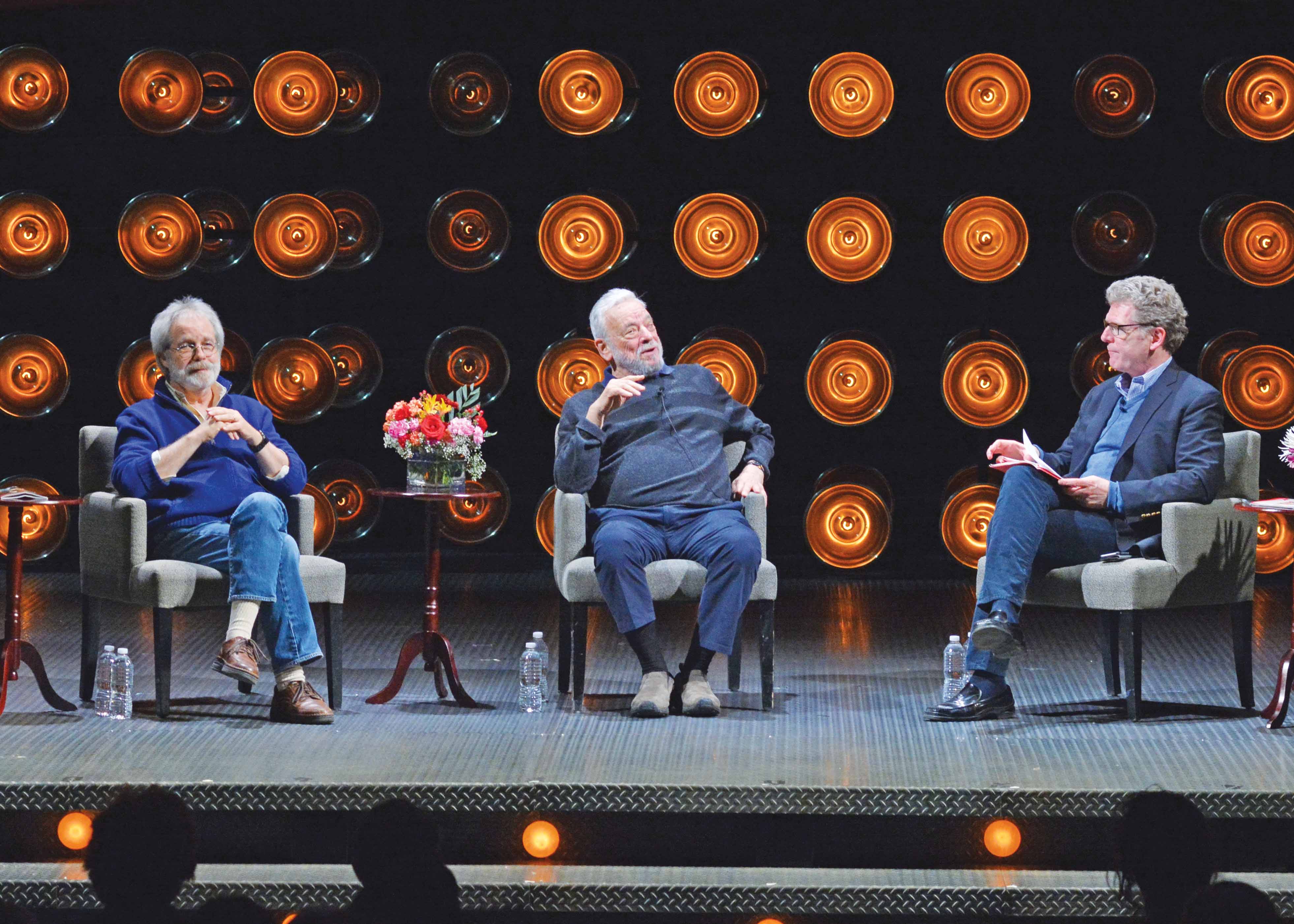
Courtesy of Michael Marsland
Last Wednesday, on the stage of the Yale Repertory Theatre’s production of “Assassins,” sat the musical’s original creators, Broadway composer-lyricist Stephen Sondheim and librettist John Weidman LAW ’74 for a widely-attended talk moderated by Yale theater studies professor Daniel Egan.
The event drew a full house of audience members to the University Theatre, a crowd comprised mainly of members of the Yale community, cast and crew members of “Assassins” and patrons of the Yale Rep. Egan, Sondheim and Weidman engaged in conversations about the creation, history of critical reception and complex current relevance of “Assassins.”
“Mounting any musical is a huge undertaking,” said Egan, who heads the Shen Curriculum and created Yale’s first seminar on Sondheim’s work. “Mounting this musical at this time in this country in this place speaks volumes about the daring intelligence and integrity of the Yale Repertory Theatre, while it also speaks volumes about the role of art in assessing the national conversation and how we change — or not — across time.
“Assassins” follows the stories of several men and women who have tried to assassinate former U.S. presidents. The options for characters, described by Weidman as a “playwright’s feast,” initially included a range of historical figures reaching as far back as the murder of Julius Caesar. However, Sondheim and Weidman soon decided to limit the scope to American figures and set off to identify some common grievance among them.
During the first portion of the talk, Egan asked Sondheim and Weidman to discuss how the two artists had come together for their first collaboration in 1976, “Pacific Overtures,” which followed the difficult era of Westernization in mid-19th century Japan and mixed Broadway conventions with the traditions of kabuki theater.
Weidman was a third-year law student when, after a somewhat disenchanting summer internship at a law firm, he decided to forgo his original plan and apply to two opportunities unrelated to law. Weidman sent a letter to Broadway producer and director Hal Prince, from which he received an initial response that Prince was unsure of how to design the piece as a “straight play.”
However, Prince, a producer and director known for mentoring young artists and cultivating new musical theater, connected Weidman with Sondheim, an already established composer-lyricist. Weidman described the process of going from an audience member at performances of Sondheim and Prince’s pieces to their colleague as “mind-bending.”
Still, Sondheim had his own interpretation of his initial collaboration with Weidman on the experimental piece.
“I remember thinking, he gets it the way I got it,” said Sondheim.
As a librettist and a former student of law, Weidman first suggested political plots. He said that he had wanted to do a musical based on the Paris Peace Conference of 1919. However, upon finding a draft of a play entitled “Assassins,” Sondheim became fascinated with the title and the two set off to create a musical based on the lives of assassins throughout history. Weidman said he was captivated by the idea because he considered his first experience with grief to have been the assassination of former President John F. Kennedy.
Weidman and Sondheim said that the process required little editing, and Sondheim said that reading Weidman’s first draft in his Connecticut home was the “single most exciting moment” in his artistic life.
The two artists also reflected on the production and its critical history. A 1990 off-Broadway production at the Playwrights Horizons was reportedly met with anger, and theater reviewers were afraid of the piece’s controversial content. However, a 2004 production received more Tony Awards than the Broadway mega-musical Wicked.
Sondheim and Weidman noted that the production history of “Assassins” continues to grow. In addition to future and current Broadway revivals of other Sondheim works including “Sweeney Todd” and “Sunday in the Park,” “Assassins” will be playing at the City Center this summer in New York City. The session culminated with a Q&A session with audience members, with inquiries ranging in topic from how the collaborators view the future of Broadway to how the presidency of Donald Trump alters the significance of “Assassins.” When a current Yale College senior asked if the creators could offer any advice for students aiming to go into theater professionally, Sondheim responded with lyrics from “Sunday in the Park with George”: “Anything you do, let it come from you. Then it will be new.”
The production of “Assassins” and the discussion event symbolized the growing relationship between the Yale School of Drama, the Yale Rep and the Shen Curriculum for Musical Theater at Yale College of which Egan is the coordinator. In particular, undergraduates not only attended the talk, but are also serving as understudies for “Assassins” alongside professionals and School of Drama students.
“Assassins” runs until April 8 at the University Theatre.
Correction: Due to an editing error, a previous version of this article said that theaters, not theater reviewers, were afraid of “Assassins'” controversial content.







